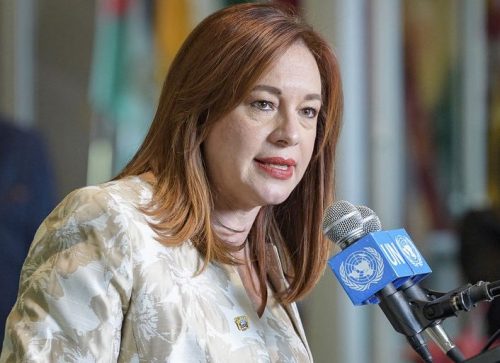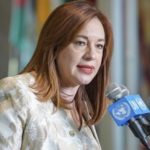The President of the United Nations General Assembly (UNGA), Ms Maria Garces says full participation of women in different sectors is critical to the attainment of the Sustainable Development Goals (SDGs), peace and security.
She made the assertion in Abuja while presenting a paper entitled:“The Role of Women and Girls in the achievement of the SDGs, including sustaining peaceful societies” at the Ministry of Women Affairs and Social Development.
Garces said that despite progress made, women still lagged behind in every SDGs target, adding that the gap was greater for older women, women with disabilities, women in rural areas, minority and indigenous communities.
She said participation of women in the military would also ensure a peaceful society. “Yes, it is progress that 24 per cent of parliamentarians are women, but it is not parity and we know that women in politics face enormous hurdles, including verbal, physical and sexual abuse.
“Yes, we have made progress on women’s economic empowerment, but just 42 per cent of countries afford women the same rights to land ownership. Just 60 per cent give women equal access to financial services.
“And at current rates, the global gender pay gap is not due to close until 2086 – with huge knock-on effects for women’s social protection and status.
“We have made progress on women’s education, but enrollment statistics mask participation rates – and quality of outcomes.
“It is unacceptable that there are still more than 40 countries in the world where over 20% of women are illiterate. “And while there is certainly more emphasis now on role of women in conflict settings, it is still the case that just 2% of mediators and 8% of negotiators are female.
“Perhaps most worryingly, even the gains we have made are now at risk – as there is a growing backlash against women’s rights, most prominently in the area of sexual and reproductive health.
“So, we must all continue to make the case for the full inclusion of women and girls in efforts to achieve the SDGs, it is not a difficult case to make”, Garces said.
Garces said there was a wealth of evidence on the positive impact that women’s participation in politics has on economic stability, good governance and investment in areas such as health, education and social protection.
She said that according to the UN Educational, Scientific and Cultural Organisation (UNESCO), 2.5 million new engineers and technicians would be needed to achieve the SDGs on water and sanitation in sub-Saharan Africa.
The UNGA president said that men alone cannot make up this shortfall, stressing the need for women and girls to pick the gauntlet.
Hajiya Aisha Abubakar, Minster of Women Affairs and Social Development said that Nigeria was committed to redoubling efforts at ensuring gender equity and fundamental rights of women and girls.
She said that in a bid to meet objectives of the SDGs, the President Muhamadu Buhari-led administration had created economic structures and infrastructure to create jobs for youth and women.
Abubakar enumerated several interventions of the Federal Government in meeting the SDGs, most of which have recorded laudable achievements.
She called for more support of the UNGA President, cooperation and partnership of the International Community founded on true commitments to sustainable funding of development strategies.
Mr Anthony Ojukwu, the Executive Secretary of the National Human Rights Commission also called for more participation of women in politics, noting that the number of women parliamentarians in the ninth National Assembly was low.





